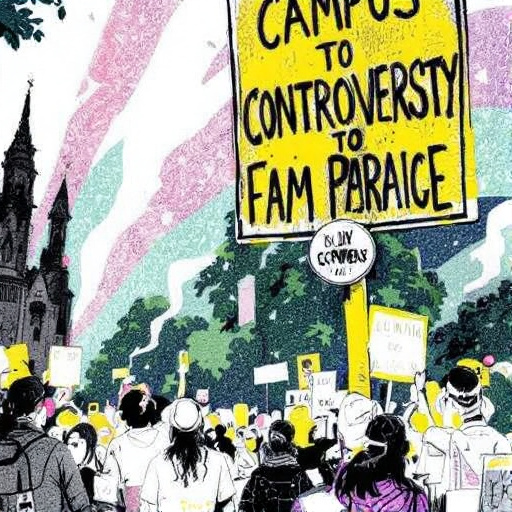Featured Articles
- 8 Ways College Alumni are Revolutionizing Sustainable Urban Development in Emerging Cities
- Alumni Activism: How College Graduates are Shaping the Future of Social Movements and Policy Change
- Alumni as Crypto Investors: Unlocking Hidden Connections Between College Networks and the Blockchain Revolution
- From Campus to Controversy: The Hidden Impact of Alumni Networks on Modern Activism
- "From Campus to Cosmos: How College Alumni Are Shaping Space Exploration and Technology"
From Campus to Controversy: The Hidden Impact of Alumni Networks on Modern Activism
From Campus to Controversy: The Hidden Impact of Alumni Networks on Modern Activism
The complex relationship between alumni networks and modern activism unveils hidden dynamics that shape societal movements today. This article explores how these networks, often underestimated, influence social change, create controversies, and mobilize communities across generations.
Networking: The New Form of Mobilization
Certainly, in the 21st century, networking has transcended a mere social endeavor; it has become a powerful tool for activism. According to research by the Pew Research Center, about 69% of adults aged 18-29 use social media to advocate for causes they care about, showcasing how pipelines can be created from college camaraderie to real-world action (Pew Research Center, 2021).
The Genesis of Alumni Networks
You might be surprised to learn that the typical alumni network often began with something as simple as a bulletin board in the student union. Fast forward a few decades, and these networks now wield immense political and social power. Universities, from Ivy League institutions to community colleges, have established alumni associations that not only connect former students but also promote various causes and fundraise for important initiatives. Schools like Harvard and Stanford have seen their alumni groups raise millions for both scholarships and social movements.
From Ties to Influence: The Case of the Ivy League
Imagine a casual gathering at a high-end cocktail bar where an alumnus of Yale happens to bump into a venture capitalist. Over hors d'oeuvres, they discuss the nonprofit after-school programs that could use funding. This isn’t just a story; it’s a typical scenario that showcases how an informal conversation can lead to substantial contributions to community projects. Alumni from elite institutions often find it easier to rally support due to their extensive, and sometimes, exclusive networks.
Controversial Movements: When Alumni Organizations Clash
Yet, as these networks grow, so do the potential for controversies. Recently, alumni from a certain prestigious university banded together to protest against their own institution’s fossil fuel investments. This grassroots campaign, dubbed "#DisinvestNow," drew national media attention and led to heated debates among alumni factions. Some supported the cause passionately, citing moral responsibility, while others argued that the alumni association should focus solely on fundraising. Here, we see alumni networks as a double-edged sword – they can foster unity but can also breed discord. Isn’t it intriguing how the very group meant to provide support can create such rifts?
The Power of Education in Shaping Activism
Education undeniably plays a pivotal role in influencing the causes alumni champion. A study conducted by the Institute for Social Research revealed that college-educated individuals are 1.5 times more likely to be involved in activism compared to their non-college counterparts (Institute for Social Research, 2020). This statistic underscores how universities act as breeding grounds for critical thinking and social awareness. Students often graduate not just with a diploma but with a fire ignited within to create change.
A Personal Encounter: The Activist’s Tale
Allow me to take you on a nostalgic trip. Imagine a college student, perhaps around 22 years old, who is brimming with ambition and hope. This student, let’s call her Maya, spent countless nights organizing protests for environmental justice on campus. Fast forward a few years. Today, Maya is leading a national climate change organization, securing partnerships with her alumni contacts from both university and earlier activism. Her story registers a profound truth: the connections forged in youth can propel movements in unexpected ways.
Intergenerational Differences in Activism
As the landscape of activism evolves, it becomes vital to understand the different perspectives brought by various generations. Baby boomers often emphasize large-scale organizations such as unions and traditional nonprofit structures, while millennials and Gen Z prioritize grassroots movements, tech-driven initiatives, and quick mobilization through platforms like TikTok. A study by McKinsey found that 70% of millennials engage in volunteer work outside their formal obligations, pushing alumni networks to adapt their methods to stay relevant (McKinsey, 2021).
Alumni Networks Breaking Barriers
Let’s look at another aspect: alumni networks often serve as bridges across barriers. For instance, the “Black Alumni Association” from a well-known university launched a mentorship program for underprivileged youth. They paired alumni working in various sectors with local high school students. The program, which started as a small initiative, quickly blossomed into a city-wide movement, showcasing how alumni with different backgrounds and experiences can come together to uplift communities.
The Ripple Effect of Success
Success within alumni circles can create a domino effect. Think about successful alumni who are invited to speak at their alma mater. Not only does this contribute to a sense of pride within the institution, but it also inspires current students to pursue activism and entrepreneurship. According to research by the Alumni Association, 85% of students who attended events with successful alumni reported feeling more inspired to affect change in their communities (Alumni Association Survey, 2022). Together, they can effectively create new generations of activists.
Case Study: The Power of Social Media
A compelling example of alumni influence through social media can be seen in the viral “#AlumniForChange” movement. A group of alumni from various universities united online, sharing stories of inequities experienced on campus. Their collective voices reached millions of people, initiating conversations about educational reform across the nation. Thanks to platforms like Twitter and Instagram, they were able to build momentum quickly and sustain their activism beyond the confines of university walls.
Too Many Voices or a Unified Message?
The myriad of voices within alumni networks leads to another intriguing dynamic—how do they maintain a unified message? With diverse opinions, it can often feel like a cacophony. For instance, during the #MeToo movement, alumni from a particular university wrote an open letter detailing their experiences with harassment. While many supported the initiative, others opted against any affiliation or endorsement, marking a pivotal moment that showcased the struggle for consensus within large networks.
Global Movements Echo Through Alumni Connections
Furthermore, consider this a global phenomenon! Think of the powerful “#BringBackOurGirls” movement that gained traction to bring attention to kidnapped Nigerian girls. Alumni from various universities around the world joined forces, using their collective networks to raise awareness, organize protests, and apply pressure on governments. Here we see excellence transcending borders, highlighting how alumni networks can indeed propel local issues onto global stages.
The Future of Alumni Networks in Activism
As we venture further into a new decade, what does the future hold for alumni networks and their impact on activism? One possibility is that these networks may evolve into digital platforms. With the advent of blockchain technology and decentralized networks, we might see a rise in collaborative spaces where alumni from various fields can rally behind specific social issues, volunteer, or fundraise without the traditional barriers. Cutting-edge tools combined with the generosity of networks could transform advocacy in ways we can only speculate right now.
Conclusion: The Closing Argument
In summary, the hidden impact of alumni networks on modern activism is profound and multifaceted. From networking to controversies, they create platforms through which voices are amplified or diluted, depending on the issue at hand. It is remarkable how these connections formed long ago can evolve into significant social movements, shaping our world for the better. As younger generations discover their voices and join these networks, we find that the legacy of activism is sustained and enriched, reminding us that change is not just a single event but rather an enduring journey.
So whether you’re a fresh graduate or a seasoned alum, remember: every connection has the potential to ignite change and influence the world—keep those alumni ties strong!




